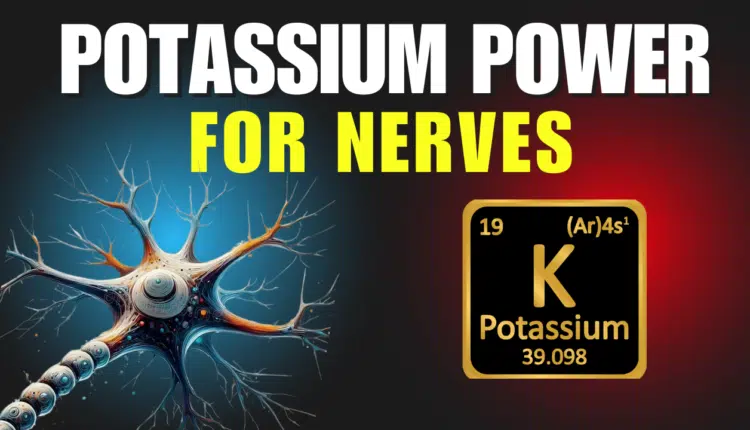Potassium: The Overlooked Electrolyte Essential for Nerve Health
We often hear about electrolytes, such as potassium, magnesium, calcium, etc.
Although all the electrolytes are essential, your body needs 4700 mg of potassium daily to keep your nerves healthy. There is no other nutrient that the body needs this much to stay healthy, but potassium is the most overlooked electrolyte by most doctors.
Why are Potassium Deficiencies Hard to Detect?
Potassium deficiency is not easy to diagnose. Unlike other nutrients, cells store most of the potassium, not in the bloodstream. A standard blood test only measures a fraction of the potassium in the body. As a result, levels can appear normal, even when they are dangerously low.
When a deficiency appears on a blood test, the symptoms can already be severe, impacting nerve health, heart rhythm, and muscle function.
We estimate that 98% of Americans do not consume enough potassium, leading to widespread deficiencies. These deficiencies start mild and then escalate to a severe state.
Key Symptoms of Potassium Deficiency
Potassium plays an essential role in both the peripheral and central nervous system. When your potassium is low, nerves cannot send signals properly. Your nerves become overly excitable or may struggle to fire off a signal at all. You may experience symptoms like,
- Twitching or tremors
- Tingling or numbness
- Muscle cramps
- Spasms
- Muscle weakness or fatigue
In some cases, patients feel heavy and have difficulty lifting their bodies. Potassium is essential for muscle contraction. Other symptoms may include,
Slow Reflexes
Potassium deficiencies also slow reflexes. Potassium is essential for fast, coordinated nerve responses. When nerves do not fire correctly, the reflex responses slow, which can be dangerous, especially when driving.
Reduced Blood Flow
Furthermore, a deficiency also interferes with nerve repair and regeneration because it reduces blood flow to the peripheral nerves. The reduced blood flow limits the body’s ability to transport nutrients and oxygen to damaged nerve cells, a crucial part of nerve regeneration.
Heart Health
Your body’s need for potassium goes beyond your nervous system. When the levels of this electrolyte drop too low, it disrupts normal heart rhythm and function, leading to,
- Arrhythmias (irregular heartbeat)
- Palpitations (sensation of fluttering, pounding, or skipped heartbeats)
Low levels can also slow your heart rate, known as bradycardia.
High Blood Pressure
Potassium deficiencies also can cause high blood pressure or cardiac arrest (your heart suddenly stops beating).
Various Diseases
Research shows that chronically low potassium levels are associated with many diseases, such as,
- Insulin resistance
- Type 2 diabetes
- Kidney stone formation
- Osteopenia
- Osteoporosis
The trouble arises from potassium deficiencies being notoriously difficult to detect through blood work. It is essential to recognize the symptoms and pay attention to warning signs. With vigilance, you can catch a deficiency long before your doctor.
What Causes Potassium Deficiency?
It’s important to know the signs and symptoms of potassium deficiencies but it’s equally critical to understand what are the common causes.
Diet Low in Potassium-Rich Foods
If you do not regularly eat foods like avocados, spinach, acorn squash, white beans, and sweet potatoes, you likely are not consuming enough potassium.
If you are following a keto diet, you may be avoiding some starchier foods. However, leafy green vegetables can also provide a lot of potassium.
The average person consumes, at best, one and a half cups of vegetables a day, which is not enough to meet the body’s demands.
Most processed foods are high in sodium, which further depletes potassium. If you have a high sodium intake, your potassium often depletes faster.
High Levels of Stress
Chronic stress elevates hormones like cortisol, which increases potassium loss. The body excretes it more rapidly through the kidneys.
Dehydration
When you do not drink enough water, your electrolytes become more concentrated, causing a larger loss of minerals like potassium. Proper hydration dilutes your urine, preventing loss.
Also, alcohol and caffeinated drinks like coffee and tea have a diuretic effect on the body, causing more mineral loss.
Medications
Many medications increase potassium loss through the urine. The medications include diuretics (HCTZ or furosemide), certain blood pressure medications, corticosteroids (prednisone), and laxatives.
Bronchodilators (for Asthma and COPD)
Medications like albuterol can cause potassium levels to drop.
Excessive Sweating
Heavy sweating during intense exercise or in hot climates can deplete potassium.
Various Health Conditions
Kidney disease, inflammatory bowel disorders, irritable bowel syndrome, and chronic diarrhea can reduce the body’s ability to absorb potassium from food.
If any of the above categories apply to you, we highly recommend raising your dietary intake by taking a supplement.
How Much Potassium Do I Need?
The RDA (recommended daily allowance) shows that adult men over the age of 19 should consume 3400 mg of potassium daily, while women of the same age group need more than 2600 mg.
However, we need more potassium than the RDA’s recommendation. The RDA’s numbers are based on the minimum amount of a nutrient necessary to stay alive, not to be healthy. So, the RDA’s numbers are below the actual numbers for maintaining or restoring health.
Studies revealed the optimum daily dosage is between 4000 to 4700 mg for optimal health. If you suffer from conditions like diabetes, peripheral neuropathy, heart disease, or kidney stones, you need a higher dosage than this.
Potassium and Chronic Kidney Disease
With chronic kidney disease, doctors likely have told you that potassium is harmful to your kidneys because they are already diseased or damaged. They recommend limiting potassium-rich foods. However, this is only partially true.
It only becomes a serious issue for those in stage four or five kidney disease because the kidneys operate at less than 29% function. As a result, they struggle with excreting potassium. For stage three or lower, you do not need to limit foods unless your blood work shows elevated levels.
The average supplement only provides 99 mg per capsule, so it’s vital that you consume a diet rich in potassium.
What Foods Have Potassium?
Here are potassium-rich foods you should be eating:
- Avocados (975 mg in one medium avocado)
- 1 cup of Swiss Chard (961 mg)
- Beet greens (909 mg per cup, cooked)
- Acorn squash (896 mg per cup)
- 1 cup of cooked spinach (839 mg)
- 1 cup of cooked navy beans (829 mg)
- 3 ounces of cooked, wild-caught salmon (386 mg)
- Sweet potato (541 mg in one medium sweet potato)
Potassium is the powerhouse behind your nerves, heart, muscles, and energy. You can make a difference in your life by meeting your body’s potassium needs and improving your nerve recovery. The choice to thrive starts with you!
Struggling with Neuropathy?
Dr. Coppola and Dr. Monteiro’s dedication to combating neuropathy is deeply personal, stemming from Dr. Monteiro’s experience with her mother’s severe chemo-induced neuropathy. This personal journey fueled their commitment to develop a systematic, drug-free approach to reversing neuropathy.
They founded the San Antonio Neuropathy Center, where they’ve successfully treated over 18,000 patients over the past two decades. Their acclaimed book, “Defeat Neuropathy Now in Spite of Your Doctor,” along with their neuropathy product line, stands as a testament to their expertise and innovative solutions.
Recognized as leading neuropathy specialists in America, Dr. Coppola and Dr. Monteiro offer a beacon of hope for those diagnosed with this challenging condition. If you or a loved one is seeking relief from neuropathy, reach out to us at 844 400-0101 or email us through our contact page – Click here.
Your path to healing can start today.



Comments are closed, but trackbacks and pingbacks are open.